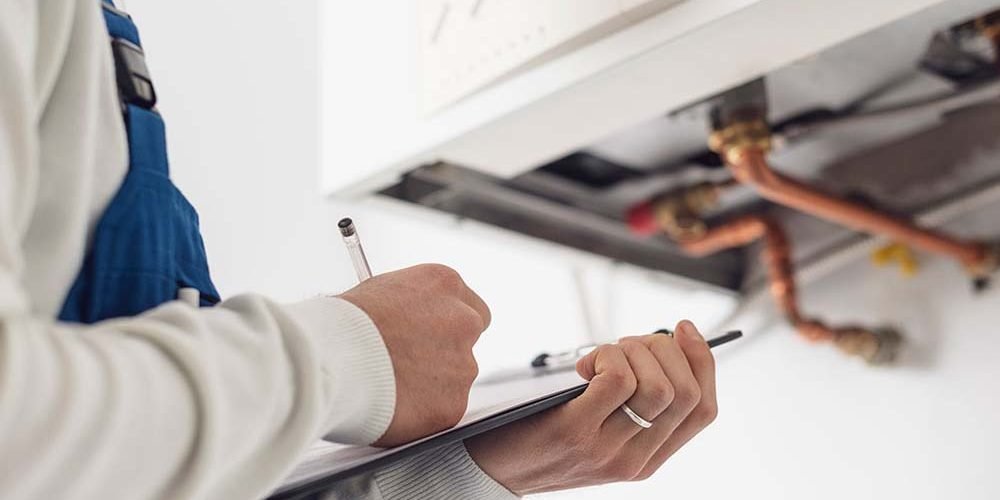If you’re considering installing a new boiler in your home or workplace, you’ve come to the right place. In this comprehensive guide, we’ll walk you through everything you need to know about boiler installation, from the benefits of upgrading to choosing the right system for your needs.
Table of Contents
Why Should You Consider Boiler Installation?
If your current boiler is old, inefficient, or frequently breaking down, it may be time to consider a new boiler installation. Upgrading to a modern and energy-efficient boiler can offer a range of benefits, including:
- Reduced energy bills: Newer boilers are designed to be more energy-efficient, helping you save money on your heating bills in the long run.
- Improved heating performance: Modern boilers offer better heating performance, ensuring consistent and comfortable temperatures throughout your home or workplace.
- Enhanced reliability: Older boilers tend to experience more breakdowns, leading to costly repairs and inconvenience. Installing a new boiler can provide peace of mind with improved reliability.
- Reduced carbon footprint: Energy-efficient boilers contribute to reducing greenhouse gas emissions, promoting a greener and more sustainable environment.
Who Should You Consider For Your Boiler Installation?
When it comes to choosing a provider for your boiler installation, you want a company that offers top-notch service, competitive prices, and a stellar reputation. Look no further than Boiler Central, the preferred choice for many in the UK. With excellent ratings on Trustpilot and unbeatable prices, Boiler Central is the go-to option for efficient and cost-effective boiler installations.
Why Choose Boiler Central?
- Excellent Ratings on Trustpilot
- Competitive Prices
- Hassle-Free Installation Process
- Excellent Customer Service
- Wide Range of Boiler Options
Types of Boilers
Before diving into boiler installation, it’s important to understand the different types of boilers available. Here are some common options:
- Combi boilers: Combination boilers, or combi boilers, are a popular choice as they provide both hot water and central heating in a single unit. They are space-saving and ideal for smaller properties or households with low hot water demand.
- System boilers: System boilers work alongside a separate hot water cylinder, ensuring a constant supply of hot water for multiple taps simultaneously. They are suitable for larger households with higher hot water requirements.
- Conventional boilers: Conventional boilers, also known as regular or heat-only boilers, require a cold water storage tank and a hot water cylinder. They are suitable for properties with existing heating systems and high hot water demands.
Factors to Consider Before Installation
Before embarking on a boiler installation project, there are several factors to consider to ensure you choose the right system for your needs:
- Property size and demand: Assess the size of your property and consider the number of bathrooms and occupants. This will help determine the boiler capacity required to meet your heating and hot water needs.
- Energy efficiency: Look for boilers with high energy efficiency ratings, such as those with an ErP (Energy-related Products) rating of A or above. Higher efficiency boilers can significantly reduce your energy consumption and bills.
- Fuel type: Decide on the fuel type that best suits your needs. Gas, oil, and electric are the most common options. Consider availability, cost, and environmental impact when making your decision.
- Budget: Set a budget for your boiler installation project, taking into account the upfront cost of the boiler, installation charges, and any additional components or modifications required.
- Warranty and after-sales support: Check the warranty period offered by the manufacturer and inquire about the availability of after-sales support, as these factors can provide added peace of mind.
Sizing Your Boiler
Sizing your boiler correctly is crucial for efficient and effective heating. A boiler that’s too small will struggle to meet the heating demands of your property, while an oversized boiler will lead to wasted energy. To determine the appropriate size:
- Consult a professional: It’s recommended to consult a heating engineer or a professional installer who can accurately calculate the heat load requirements of your property.
- Consider heat loss: Take into account factors like insulation, double glazing, and overall heat loss of your property to ensure the boiler’s capacity matches your specific needs.
- Hot water demand: If you have multiple bathrooms or high hot water requirements, discuss this with the professional installer to ensure the boiler can handle the load.
Boiler Installation Process
Installing a boiler typically involves the following steps:
- Initial assessment: A qualified heating engineer will assess your property, discuss your heating requirements, and help you choose the right boiler.
- Obtaining quotes: Request quotes from multiple installers to compare prices, warranties, and services offered. Ensure the installers are Gas Safe registered (for gas boilers) or certified for other fuel types.
- Preparation: The installer will schedule the installation date, ensuring all necessary preparations are made, such as removing the old boiler, disconnecting utilities, and preparing the installation area.
- Installation: The installer will fit the new boiler, connecting it to the necessary pipes, flue, and controls. They will also ensure proper ventilation and safety measures are in place.
- Testing and commissioning: The installer will thoroughly test the new boiler, checking for leaks, proper functioning, and compliance with safety regulations. They will also explain the boiler’s controls and features.
- Final checks: Once the installation is complete, the installer will perform final checks, clean up the work area, and dispose of any old equipment.
- Handover and documentation: The installer will provide you with all the necessary documentation, including the warranty, user manuals, and Gas Safety Certificate (for gas boilers).
FAQs
How long does a boiler installation take?
The duration of a boiler installation can vary depending on factors such as the complexity of the project, the type of boiler being installed, and any additional modifications required. On average, a standard installation can take anywhere between 1 to 3 days.
Do I need to hire a professional for boiler installation?
Yes, it’s highly recommended to hire a professional heating engineer or an installer registered with the relevant regulatory bodies, such as Gas Safe for gas boilers. DIY installation is not advisable, as it can lead to safety hazards, invalidation of warranties, and inefficient operation.
What are the signs that indicate the need for a new boiler?
- Frequent breakdowns and repairs
- Uneven heating or hot water fluctuations
- Increased energy bills
- Age of the boiler (typically over 10-15 years)
- Strange noises or leaks
What factors affect the cost of boiler installation?
The cost of boiler installation can vary depending on factors such as the type and size of the boiler, the complexity of the installation, any additional components or modifications required, and the location. It’s best to obtain multiple quotes from reputable installers to compare prices.
Can I upgrade my existing boiler instead of installing a new one?
In some cases, upgrading your existing boiler can be a cost-effective solution. However, this depends on the condition of your current boiler, its compatibility with modern controls and accessories, and the energy efficiency gains achievable through an upgrade. Consult a professional for advice tailored to your situation.
Are there any grants or incentives available for boiler installation?
There may be grants or incentives available for boiler installations, especially for energy-efficient models. Check with your local government or energy providers for any available schemes or initiatives that can help offset the cost of installation or provide financial assistance.
Conclusion
Investing in a new boiler installation can bring significant benefits to your home or workplace, including improved energy efficiency, reliable heating and hot water, and reduced carbon emissions. By understanding the types of boilers, considering important factors before installation, and following the correct sizing and installation procedures, you can ensure a smooth and successful upgrade. Remember to consult professionals, compare quotes, and prioritise safety to make the most out of your boiler installation.





